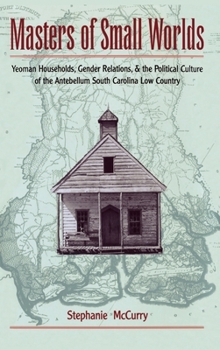Masters of Small Worlds: Yeoman Households, Gender Relations, and the Political Culture of the Antebellum South Carolina Low Country
Select Format
Select Condition 
Book Overview
In this innovative study of the South Carolina Low Country, author Stephanie McCurry explores the place of the yeomanry in plantation society--the complex web of domestic and public relations within which they were enmeshed, and the contradictory politics of slave society by which that class of small farmers extracted the privileges of masterhood from the region's powerful planters. Insisting on the centrality of women as historical actors and gender...
Format:Hardcover
Language:English
ISBN:0195072367
ISBN13:9780195072365
Release Date:May 1995
Publisher:Oxford University Press
Length:344 Pages
Weight:1.45 lbs.
Dimensions:1.3" x 6.4" x 9.2"
Customer Reviews
2 ratings
McCurry
Published by Thriftbooks.com User , 23 years ago
McCurry's 1995 work "Masters of Small Worlds," is an attempt to fill the traditional gap in American historiography of theclass between slave and planters. Her work attempts to address the question of why the South Carolina yeoman elected to defend slavery and the present social hierarchy in the nullification struggle and the succession crisis of 1860. In this aim she is largely successful, by arguing that yeoman's may not have been planters political or social equals, but the institutions of slavery and a rigid defense of property rights gave yeoman's their own sense of power within their own households and communities. Her analysis involves gender relations in the state. Men's position of dominance rested on the cultural institutions that grew out of slavery. Making them masters of small worldsOn the hole: this work is a deeply reward read. Its difficult narrative and heavily structured natures make it a challenge to read but the benefit greatly outweigh the costs.
A great book challenging popular views of yeomen.
Published by Thriftbooks.com User , 26 years ago
Masters of Small Worlds views the relationship between yeomen and planters from a new perspective. Selecting the Low Country of South Carolina for her study, Stephanie McCurry uncovers documents revealing the presence of a much-ignored yeoman class and contrasts their political and social motivations with that of the economically dominant planter aristocracy. McCurry, an Associate Professor of History in the University of California, San Diego and winner of two awards for Masters of Small Worlds, claims that yeomen were not seeking an egalitarian society, but one of republican democracy. McCurry argues that not only were these yeomen masters of their own domain, but they were instrumental in the South Carolinian secession of 1860, acting "in defense of their own identity, as masters of small worlds" (page 304). In order to support her claim, McCurry first identifies her study group. The yeomen of South Carolina, a previously ignored and invisible group accordi! ! ng to the author, emerge as a cohesive and numerically significant class from census documents and court records. McCurry selected the South Carolina Low Country as her study area because of its unique geography that placed yeomen next to planters. This side-by-side arrangement necessitated yeoman-planter interaction. McCurry's argument focuses on the patriarchal structure of plantations and yeomen families. The author cites numerous comparative examples, contrasting the planter and yeomen social relationships and successfully illustrates that white males with absolute authority ran the estates of both. The similarity of structure allowed elite manipulation of the yeomen toward planter-oriented political stances. For example, McCurry states that yeomen identified with the planters enough to feel that a threat to the established social order was a threat to their own mastery and manhood. Ultimately, this identification led yeomen to perceive abolition and unionist sentiment as ! ! a threat and enlist in the secessionist cause. While docume! nting the similarities between planters and yeomen, McCurry also notes the similarities between involuntary servitude and marriage. The author equates the lack of rights and loss of identity for women with slavery, and thus strengthens her argument that the yeomen male was a master in his own domicile. Although arguing that planters and yeomen shared similar social motivations, McCurry stresses that the two classes were unequal socially. To support this claim, the author cites examples of planter wives who snubbed yeomen or wrote of their animosity towards them. Interestingly, women, rather than men, provide clear examples of class inequality. McCurry suggests that men were forced to interact and maintain good relationships with their neighbors, regardless of class, due to business and political dealings. However, women were not so encumbered, and, according to McCurry, rarely interacted. McCurry also addresses the role that evangelism played in the so





